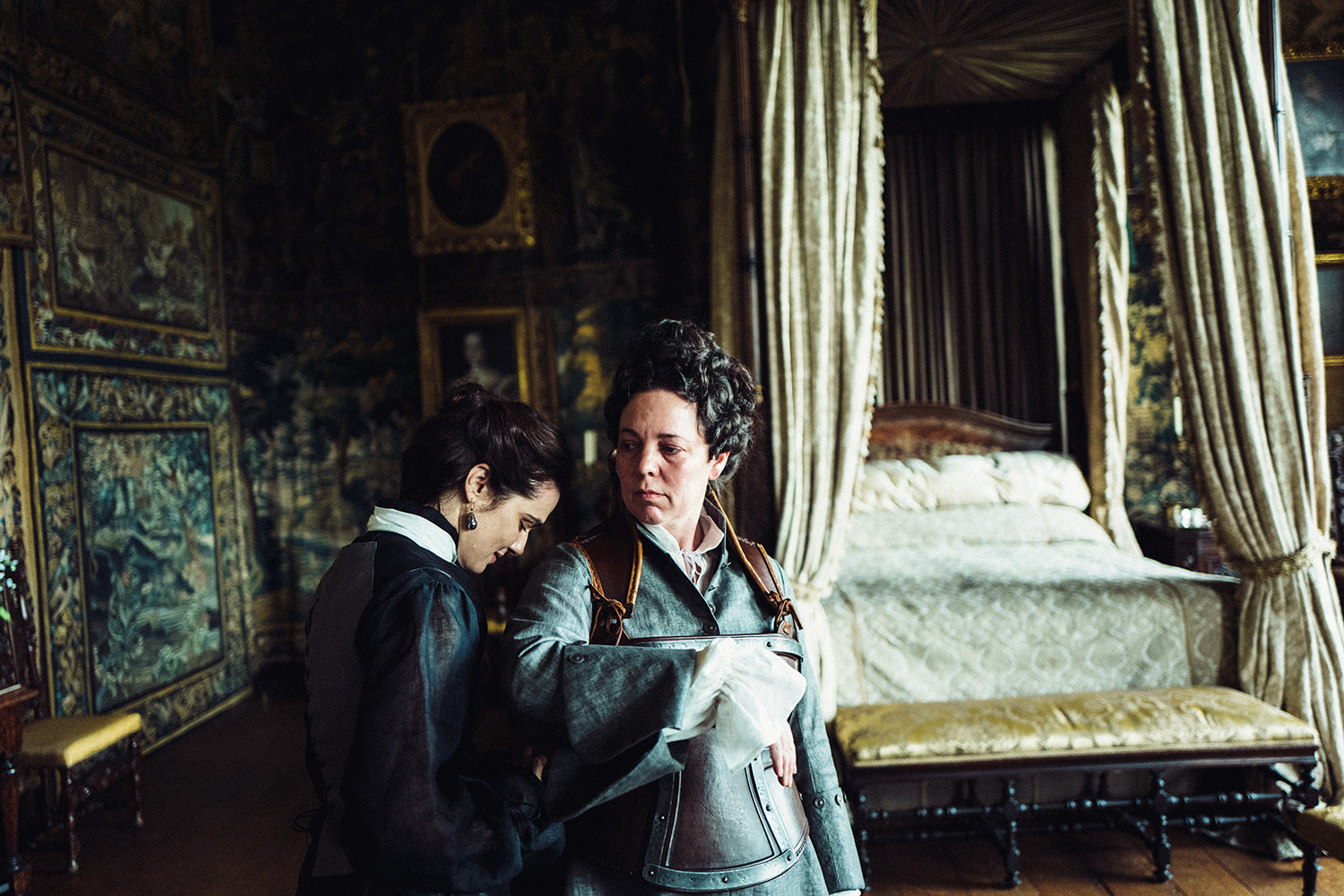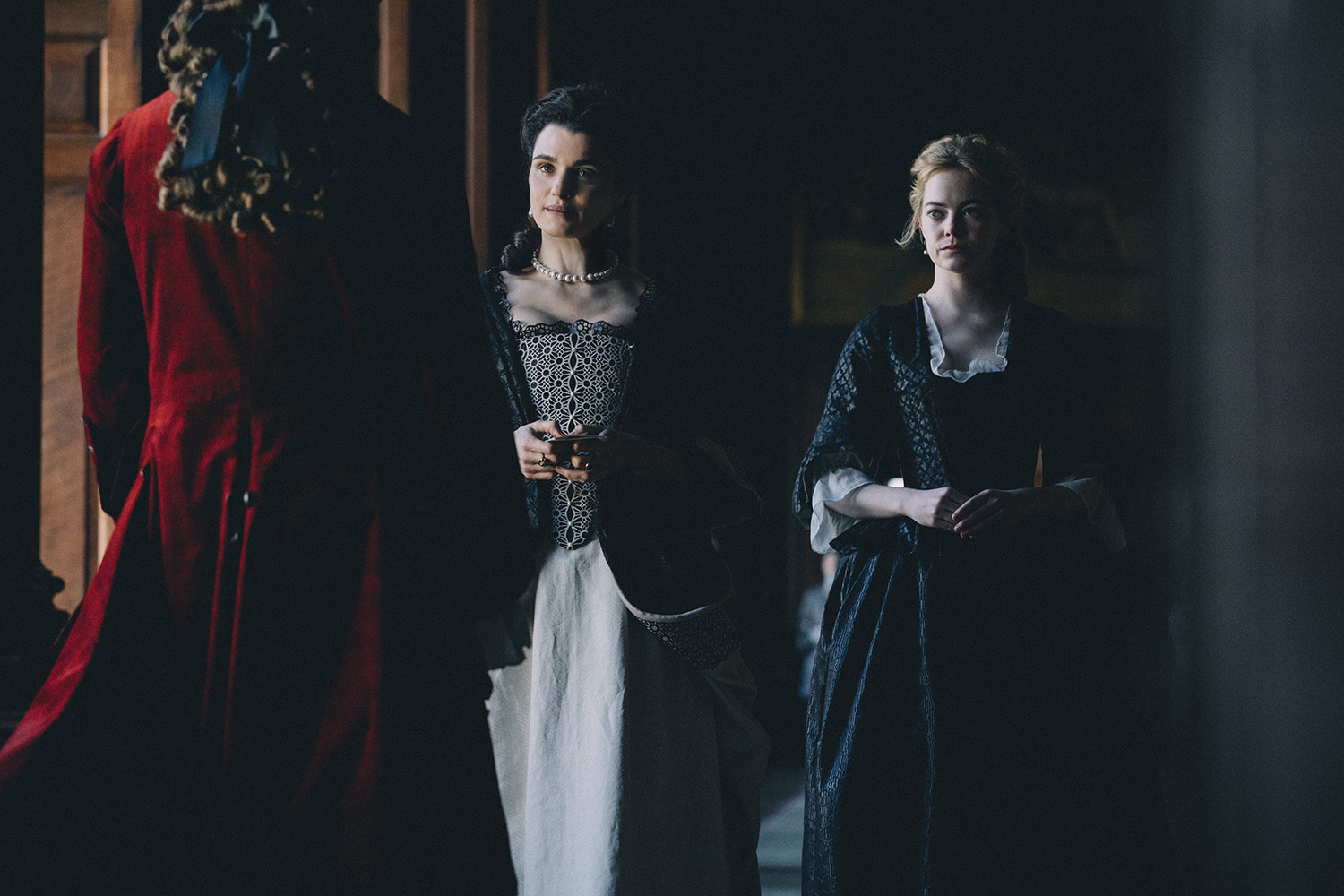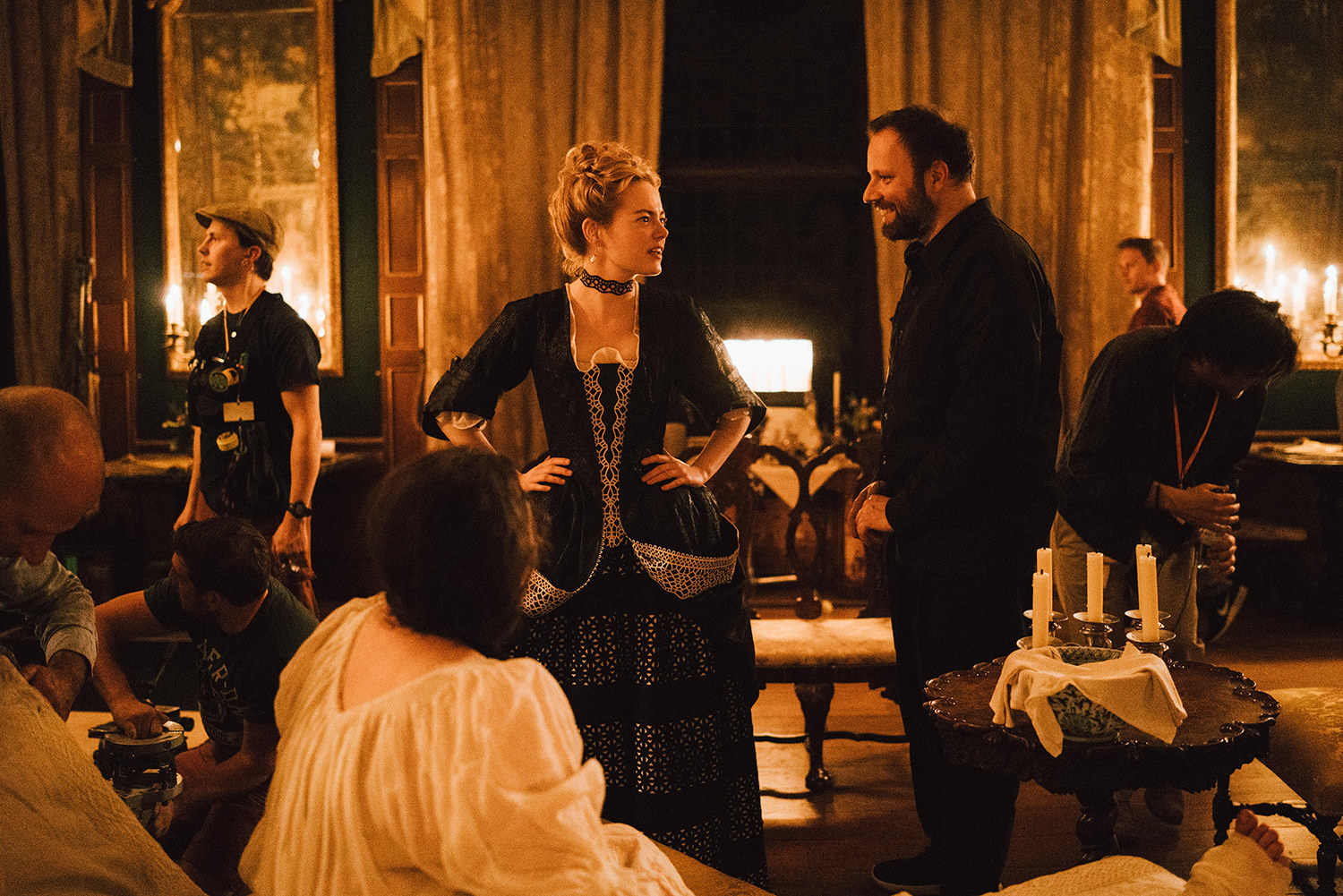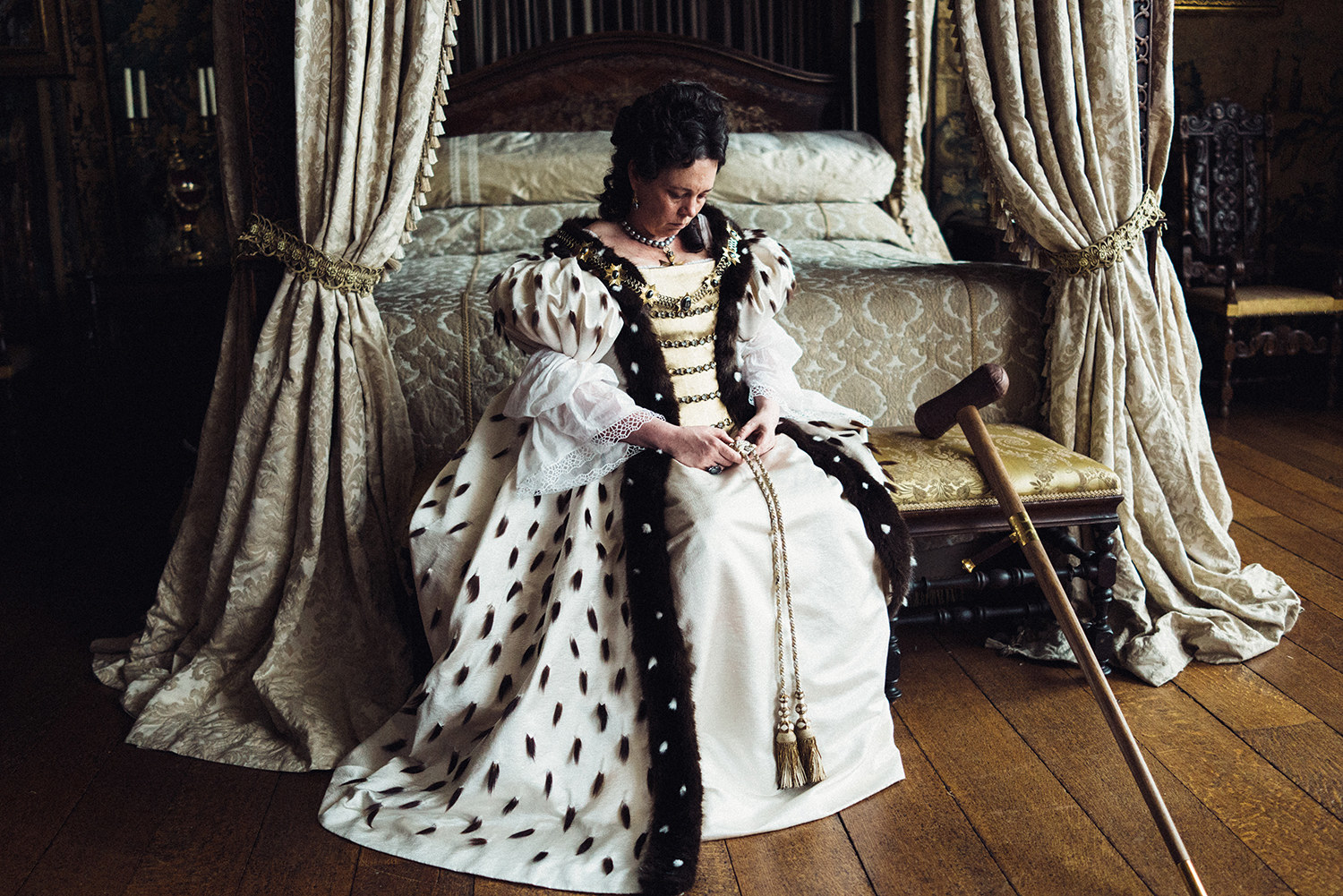The moment it begins, it becomes clear that Yorgos Lanthimos’s The Favourite is not your average period drama. Masterfully led by Olivia Colman, Rachel Weisz, and Emma Stone, the film tells the criminally unfamiliar story of Queen Anne (Colman), whose personal tragedies and physical afflictions leave her and her throne at the mercy of her childhood friend and now lover Sarah Churchill (Weisz). When Abigail Hill (Stone), a long-lost cousin of Churchill’s, arrives at the court in search of employment, she quickly climbs the ranks, seizing any opportunity to win the queen’s affections and becoming more power-hungry with every passing minute.
The film has already received huge acclaim — it won the Grand Jury Prize at this year's Venice Film Festival, and Colman, Stone, and Weisz have all collected Golden Globe and SAG Award nominations, with plenty more doubtless to come. When I met with the film’s three stars in London in October, they told me how the unique project came to be.
The movie is difficult to categorise in terms of genre. What’s your quick pitch? How would you describe The Favourite to someone who hasn’t seen it?
Rachel Weisz: Comic. Tragic. Absurd love story. Political drama.
Emma Stone: That sounds like a bunch of hashtags! Hashtag comic, hashtag tragic.
Olivia Colman: It’s a period drama reimagined. With filth.
Were you always drawn to the characters you ended up playing?
OC: Well, Yorgos told us who we were going to play, and we said, “Yes please. Thank you.” [laughs]
ES: I auditioned. I had to do my accent for him.
I heard your audition process was kind of bizarre. How did that inform how you ended up playing the character, if at all?
ES: It was, but we also did a bunch of bizarre stuff in the rehearsal process that I don’t think… Did you guys think that he was gonna do that on set? And then it was completely normal.
OC: We were all going, “What’s it going to be like when we start filming?” We were holding hands and tying ourselves in knots — so you had someone’s bum [in your face], their foot [in your armpit] — and saying the lines. Or jumping from carpet tile to carpet tile.
RW: It was basically getting to the point where nothing could embarrass you, and you could be as ridiculous and as silly and as foolish. You’d just gone to the edge of foolishness.
OC: So after that, snogging and fingering was a piece of cake. [laughs]
RW: There’s nothing funny about snogging and fingering you, my dear. I’ve never felt more serious in my life!
ES: I didn’t. I giggled.
I didn’t know much about the story when I went in, but I read up on it afterwards, and was surprised to find out how much of it was based on reality.
RW: It’s all true!
OC: Were the rabbits true?
RW: I don’t know. [laughs]
I was going to ask how much research you personally did into the history behind it…
RW: [to Olivia] You did loads, didn’t you?

OC: Oh yeah, you know me. Nose in a book all the time.
RW: Everything was on the page that we needed — in the script — I would say, whether or not you did your own private homework. I don’t know if it would have particularly helped, because the script is so rich. There’s so much detail, and the characters are so real.
OC: They had spent so many years on the script, it’d be a bit much if after one afternoon with a book, we were going, “Actually, I think you’ll find…” They’ll have decided what they want to show.
RW: That’s a really good way of looking at it.
OC: Isn’t it?! That’s how you get out of doing loads of research.
Something I really loved about the film is that it explores the different ways in which a woman can be powerful. In particular, Abigail uses her vulnerability and is underestimated because of it. Have any of you ever experienced anything like that in your real lives?
ES: Not to the point where I’ve poisoned anybody.
OC: Haven’t you? Gosh, I have.
ES: I think most people can relate to feeling underestimated, or like people don’t expect you to be able to follow through with something. That starts, I think, in childhood. Male or female, I think people can relate to that.
OC: What I’ve found interesting over the years, having children — boy children and girl children — is the way people approach a boy is, “What books do you like? What sports do you like? What’s something that’s interesting to your mind?” Whereas to a little girl it’s, “You look pretty, where’s that dress from? You’re gorgeous.” It’s nothing to do with your mind, and we are instilling that endlessly into our children. It drives me fucking mental.
So all of us will have had moments when — particularly as women — we weren’t expected to be able to do something, and hopefully you’ve got that fire in you to prove people wrong. But it’ll always happen as long as we treat our children in different ways. It’s peculiar, but we all do it. I’m trying not to do it now that I’m realising I’m doing it.

RW: The difference between this film and anything I can relate to is that, for these women, the decisions they’re making are so high-stakes. It’s not just that something trivial will happen. It’s the whole course of the history of England. These women aren’t just internally powerful: They hold positions of incredible power. The stakes don’t get any higher, right? She’s running the country, and then I do, and then you do.
ES: It’s actual survival. Where my character has come from was essentially on the streets, going through horrible things. What Sarah is going to face, if she’s thrown out, is banishment from her home country. I mean, the stakes are extremely high.
RW: It’s easy to relate to, as a woman, but I had to use my imagination for something as high-stakes as that. I mean, I’m just an actor — I just tell stories — but these women are in charge of armies and countries.
For each of you, these roles are completely different than anything you’ve played in the past. Is that important for you, to play something different? Were there challenges?
RW: What was challenging for me was learning that dance. It was a really hard thing to do.
OC: Oh fuck, you were amazing. She did it… You and Joe [Alwyn] must have done that 10 or 15 times that day. From start to finish, the whole thing.
RW: Yeah, we did. That was really challenging, because you say something different — I’m not a dancer. Well, I am now. [laughs]
OC: I had a lovely time. I just had to eat a lot.
RW: You got really plump! You really committed to that. I don’t mean–
OC: No, I did! Thank you, I hope you noticed it, because it would be heartbreaking if you didn't. The first two weeks were really fun, and then it gets really depressing, because it goes on an awful lot easier than it comes off. Yorgos was convinced that I started a little diet before the end of the film.
RW: But you didn’t?
OC: Maybe I did a little bit, but we won’t tell him.
Emma, you said at Venice Film Festival that you had a better understanding of how the end product would turn out as filming went on. How did your expectations of the film change from script to screen, if at all?

ES: Well, I didn’t know what the composition of the film was going to be. You know, the way it was shot was very interesting to watch on a daily basis — the angles he was using, that kind of wide angle. That alone makes it feel like this strange universe that we’re operating in.
From script to screen, I mean — there were chapters in the film that weren’t on the page. The script is pretty linear, and I think the film — the film is still linear, but it kind of hops around more than I was expecting. You know, I show up [covered in] mud, and I was like, “Is he not going to cut back and explain the mud?” And then he does. I was very nervous, though, that we were just not going to explain. The second time I saw it, I think, I could watch it more clearly because I was translating so much the first time.
OC: You’re a proper lens nerd, so you understood. [to Rachel] Do you like lenses and stuff?
RW: No. I saw it when I watched the film, that it was a fisheye lens.
OC: Like, “Oh, that’s what that was!” You [Emma] were more aware that it was going to look different, but when I first saw it, I had no idea! There were lots of shots from down here.
ES: But I kind of love that! It’s kind of scary.
OC: It’s refreshing to be allowed to…
RW: Have a double chin.
OC: Yeah! To look like a normal person!
Olivia, in terms of your character, I was particularly interested in that moment where she explains that she almost had 17 children. I’m curious about her role as a mother, and how that influences not only how you play her, but also how you feel about her as a person.

OC: She did have 17 children. One of them lived to 11, some lived to 2, 5… So she had these children. From that moment, I think you excuse her behaviour. Once you know she suffered the most extraordinary pain, not just once, but over and over again, I found her behaviour sort of… Fuck it, do what you like, love, because that’s horrific.
I always imagined her childhood with her dear friend Sarah, sort of under-confident and under-loved. If you feel loved and lovable, you can have a lot of confidence as a grownup, but I don’t know if she ever felt that. So that explains her wild childishness. Also, she suffered ill health all her life, and was a bit blind. It was a scary, puzzling world that she lived in.
Final question: The film is all about favourites, so what was each of your favourite scenes to film?
ES: Oh, god, I don’t think I’d be able to choose that.
What about your favourite scene to watch?
ES: I love watching the dance.
RW: One of my favourite moments — the one that comes to my mind right now — is the close-up on the queen when she’s watching my character having a really good time dancing, and all the things [Olivia] just described pass across her face. It’s really tragic and moving, and I also find it quite funny at the same time. I don’t know how you pull it off, but that’s an Olivia Colman special. The fine edge of tragedy and comedy, absolutely at the same time. She really wants to dance, and she just can’t, and she’s really enjoying the dance, but she’s really annoyed with me for lording it about with my dancing.
OC: Having a nice time.
RW: Yeah, and then she wants to go to bed. And then I take you to bed, don’t I? [laughs]
OC: Similarly, there’s that realisation when [Rachel] sees that we’re in bed, and the heartbreak in your face. Then when [Emma] sees us in bed, the eyes just can’t get any bigger. I love those moments. It’s seeing the stuff that we didn’t get to see.
The Favourite is in UK cinemas from Jan. 1, 2019.
